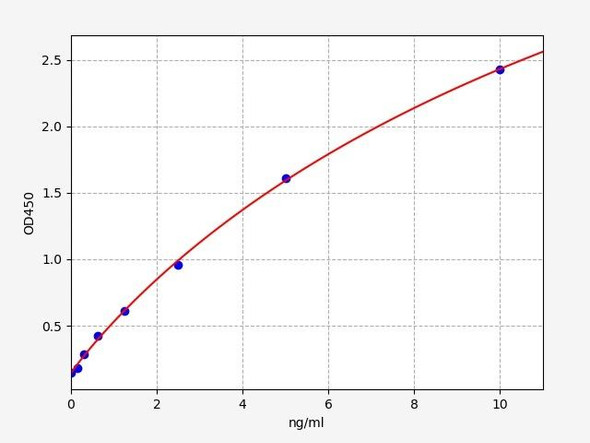Anti-SQSTM1 / p62 Antibody (CAB11247)
- SKU:
- CAB11247
- Product type:
- Antibody
- Reactivity:
- Human
- Mouse
- Rat
- Host Species:
- Rabbit
- Isotype:
- IgG
- Antibody Type:
- Polyclonal Antibody
- Research Area:
- Cell Death
Description
| Antibody Name: | Anti-SQSTM1 / p62 Antibody |
| Antibody SKU: | CAB11247 |
| Antibody Size: | 20uL, 50uL, 100uL |
| Application: | WB IHC IF |
| Reactivity: | Human, Mouse, Rat |
| Host Species: | Rabbit |
| Immunogen: | Recombinant fusion protein containing a sequence corresponding to amino acids 1-240 of human SQSTM1 / p62 (NP_003891.1). |
| Application: | WB IHC IF |
| Recommended Dilution: | WB 1:500 - 1:2000IHC 1:50 - 1:200 IF 1:50 - 1:200 |
| Reactivity: | Human, Mouse, Rat |
| Positive Samples: | HeLa |
| Immunogen: | Recombinant fusion protein containing a sequence corresponding to amino acids 1-240 of human SQSTM1 / p62 (NP_003891.1). |
| Purification Method: | Affinity purification |
| Storage Buffer: | Store at -20°C. Avoid freeze / thaw cycles. Buffer: PBS with 0.02% sodium azide, 50% glycerol, pH7.3. |
| Isotype: | IgG |
| Sequence: | MASL TVKA YLLG KEDA AREI RRFS FCCS PEPE AEAE AAAG PGPC ERLL SRVA ALFP ALRP GGFQ AHYR DEDG DLVA FSSD EELT MAMS YVKD DIFR IYIK EKKE CRRD HRPP CAQE APRN MVHP NVIC DGCN GPVV GTRY KCSV CPDY DLCS VCEG KGLH RGHT KLAF PSPF GHLS EGFS HSRW LRKV KHGH FGWP GWEM GPPG NWSP RPPR AGEA RPGP TAES ASGP SEDP SVNF LKNV |
| Gene ID: | 8878 |
| Uniprot: | Q13501 |
| Cellular Location: | Cytoplasm, Cytoplasmic vesicle, Endoplasmic reticulum, Late endosome, Lysosome, Nucleus, P-body, autophagosome |
| Calculated MW: | 38kDa/47kDa |
| Observed MW: | 62kDa |
| Synonyms: | SQSTM1, A170, DMRV, FTDALS3, NADGP, OSIL, PDB3, ZIP3, p60, p62, p62B |
| Background: | This gene encodes a multifunctional protein that binds ubiquitin and regulates activation of the nuclear factor kappa-B (NF-kB) signaling pathway. The protein functions as a scaffolding/adaptor protein in concert with TNF receptor-associated factor 6 to mediate activation of NF-kB in response to upstream signals. Alternatively spliced transcript variants encoding either the same or different isoforms have been identified for this gene. Mutations in this gene result in sporadic and familial Paget disease of bone. |
| UniProt Protein Function: | SQSTM1: an adapter protein which binds ubiquitin, shuttling proteins to the proteasome. Co-localizes along with the E3 ubiquitin ligase, TRAF6, to aggregates from Alzheimer's disease brains but not in control brain. May regulate the activation of NFKB1 by TNF-alpha, nerve growth factor (NGF) and interleukin-1. May play a role in titin downstream signaling in muscle cells. May regulate signaling cascades through ubiquitination. May be involved in cell differentiation, apoptosis, immune response and regulation of K(+) channels. Forms ternary complexes with PKCZ and Kv-beta2 or PKCZ and GABBR3. Also interacts with KCNAB1, GABRR1, GABRR2 and GABRR3. Interacts with EBI3, LCK, RASA1, PKCZ , PKCI, NR2F2, NTRK1, NTRK2, NTRK3, NBR1, MEK5, TRIM55 and MAPKAPK5. Interacts with the proteasome subunits PSMD4 and PSMC2. Interacts with K63- polyubiquitinated MAPT/TAU. Interacts with IKBKB through PRKCZ and PRKCI. Interacts with NGFR through TRAF6 and bridges that complex to NTRK1. Forms a complex with MEK5 and PRKCZ or PRKCI. Component of a ternary complex with PAWR and PRKCZ. Upon TNF-alpha stimulation, interacts with RIPK1 problably bridging IKBKB to the TNF-R1 complex composed of TNF-R1/TNFRSF1A, TRADD and RIPK1. Forms a complex with JUB/Ajuba, PRKCZ and TRAF6. 2 isoforms of the human protein are produced by alternative splicing. |
| UniProt Protein Details: | Protein type:Nuclear receptor co-regulator; Autophagy; Ubiquitin conjugating system Chromosomal Location of Human Ortholog: 5q35 Cellular Component: nucleoplasm; PML body; endoplasmic reticulum; lysosome; cytoplasm; late endosome; autophagic vacuole; cytoplasmic vesicle; inclusion body; cytosol Molecular Function:identical protein binding; protein serine/threonine kinase activity; protein binding; ubiquitin binding; protein homodimerization activity; protein kinase C binding; zinc ion binding; SH2 domain binding; receptor tyrosine kinase binding; protein kinase binding Biological Process: regulation of Ras protein signal transduction; ubiquitin-dependent protein catabolic process; nerve growth factor receptor signaling pathway; immune system process; positive regulation of apoptosis; protein heterooligomerization; macroautophagy; endosome transport; protein amino acid phosphorylation; protein localization; response to stress; autophagy; positive regulation of transcription from RNA polymerase II promoter; positive regulation of protein amino acid phosphorylation; cell differentiation; regulation of I-kappaB kinase/NF-kappaB cascade; positive regulation of macroautophagy; negative regulation of apoptosis Disease: Frontotemporal Dementia And/or Amyotrophic Lateral Sclerosis 3; Paget Disease Of Bone |
| NCBI Summary: | This gene encodes a multifunctional protein that binds ubiquitin and regulates activation of the nuclear factor kappa-B (NF-kB) signaling pathway. The protein functions as a scaffolding/adaptor protein in concert with TNF receptor-associated factor 6 to mediate activation of NF-kB in response to upstream signals. Alternatively spliced transcript variants encoding either the same or different isoforms have been identified for this gene. Mutations in this gene result in sporadic and familial Paget disease of bone. [provided by RefSeq, Mar 2009] |
| UniProt Code: | Q13501 |
| NCBI GenInfo Identifier: | 74735628 |
| NCBI Gene ID: | 8878 |
| NCBI Accession: | Q13501.1 |
| UniProt Related Accession: | Q13501 |
| Molecular Weight: | |
| NCBI Full Name: | Sequestosome-1 |
| NCBI Synonym Full Names: | sequestosome 1 |
| NCBI Official Symbol: | SQSTM1 |
| NCBI Official Synonym Symbols: | p60; p62; A170; DMRV; OSIL; PDB3; ZIP3; p62B; NADGP; FTDALS3 |
| NCBI Protein Information: | sequestosome-1 |
| UniProt Protein Name: | Sequestosome-1 |
| UniProt Synonym Protein Names: | EBI3-associated protein of 60 kDa; EBIAP; p60; Phosphotyrosine-independent ligand for the Lck SH2 domain of 62 kDa; Ubiquitin-binding protein p62 |
| UniProt Gene Name: | SQSTM1 |
| UniProt Entry Name: | SQSTM_HUMAN |

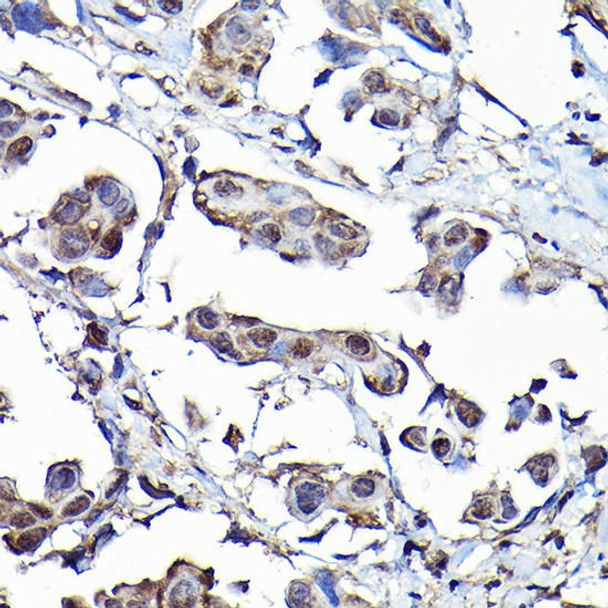
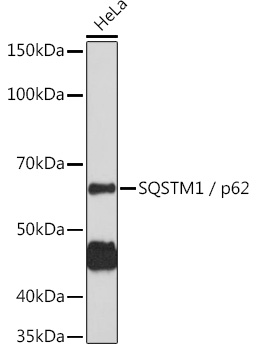
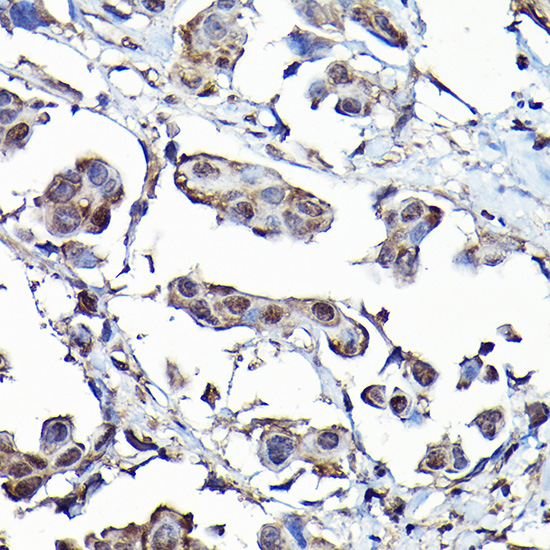
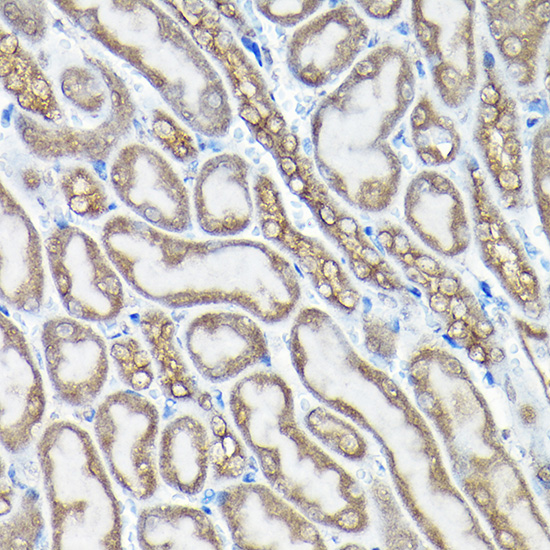
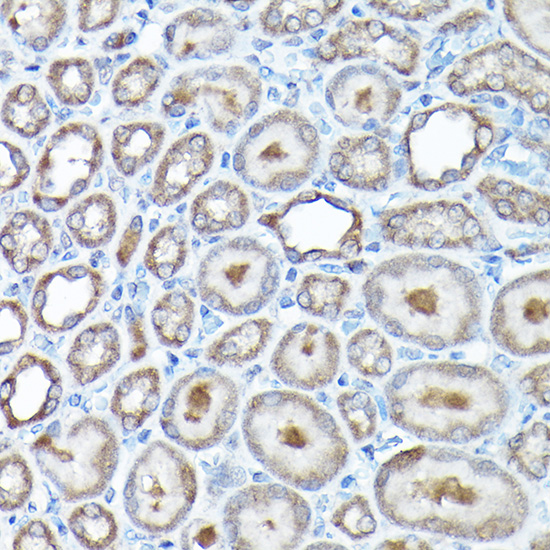
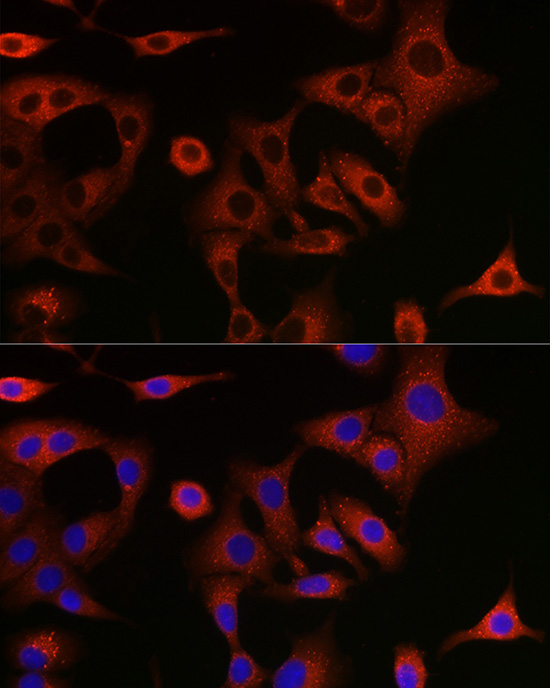
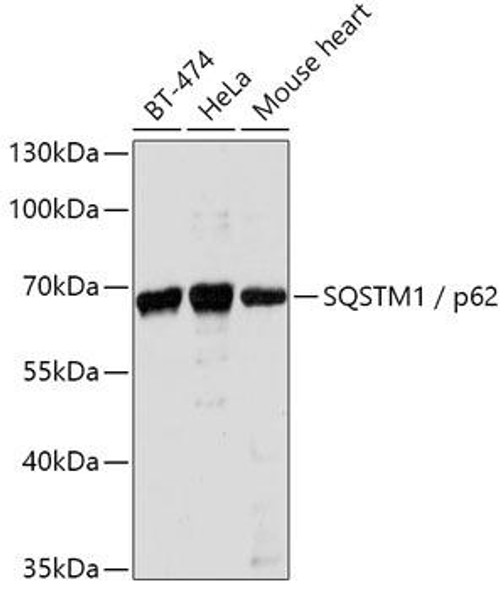

![Anti-SQSTM1 / p62 Antibody [KO Validated] (CAB19700) Anti-SQSTM1 / p62 Antibody [KO Validated] (CAB19700)](https://cdn11.bigcommerce.com/s-39x6lpnvxv/images/stencil/590x590/products/30809/28998/anti-sqstm1-p62-antibody-ko-validated-cab19700__20324__35692.1644317155.jpg?c=1)
![Anti-SQSTM1 / p62 Antibody (CAB11483)[KO Validated] Anti-SQSTM1 / p62 Antibody (CAB11483)[KO Validated]](https://cdn11.bigcommerce.com/s-39x6lpnvxv/images/stencil/590x590/products/19366/17566/anti-sqstm1-p62-antibody-cab11483ko-validated__87291__04017.1644251960.jpg?c=1)

